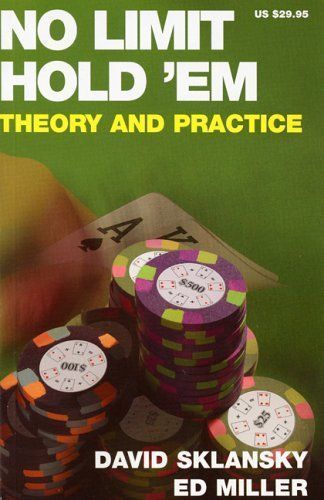 No Limit Hold'em: Theory and practice by David Sklansky and Ed Miller is probably the most comprehensive, successful, advanced and intelligent writing on the no-limit hold'em book. The book is intended for intermediate or advanced players since no introduction to poker are presented. If the concept of "pot odds" for example, is foreign to you, you can refer to many other works that reference.
No Limit Hold'em: Theory and practice by David Sklansky and Ed Miller is probably the most comprehensive, successful, advanced and intelligent writing on the no-limit hold'em book. The book is intended for intermediate or advanced players since no introduction to poker are presented. If the concept of "pot odds" for example, is foreign to you, you can refer to many other works that reference. By Jean-François 'Kidam' Mercury
No Limit Hold'em: Theory and practice by David Sklansky and Ed Miller is probably the most comprehensive, successful, advanced and intelligent writing on the no-limit hold'em book. The book is intended for intermediate or advanced players since no introduction to poker are presented. If the concept of "pot odds" for example, is foreign to you, you can refer to many other works that reference.
The book is divided into two parts and each part is in turn divided into several parts. On the one hand, the "Concepts and weapons" and the other, called the "Basic" part that wants useful to the second part I would say more theoretical "practice".
From the outset, the authors announce their departure theorem which freely, said: "Every time you play a hand differently if you knew of or the hands of your opponents, you make a mistake," 'Part. fundamental "to be the" guide "of one who just wants to minimize mistakes. It will seek to further equip the player showing him:
The book is divided into two parts and each part is in turn divided into several parts. On the one hand, the "Concepts and weapons" and the other, called the "Basic" part that wants useful to the second part I would say more theoretical "practice".
From the outset, the authors announce their departure theorem which freely, said: "Every time you play a hand differently if you knew of or the hands of your opponents, you make a mistake," 'Part. fundamental "to be the" guide "of one who just wants to minimize mistakes. It will seek to further equip the player showing him:
- Manipulate the pot size
- Adjust the size of the stacks correctly
- Winning the battle of mistakes
- Read hands
- Manipulate his opponents so that they make more mistakes than they should
The rest of the "Fundamental" section will detail these points as well as several other key aspects of hold'em poker no limit.
The second part is in my opinion more "interesting" as we enter the heart of the matter with clear concepts, statements as a joke, that can apply to all of our poker sessions.
60 in number, they are probably what I've read my most useful poker until today.
So here are a few that I considered interesting, summarized in my words.
1 - When you are in doubt, bet more It is always difficult to know exactly how much to bet.. When in doubt, go for a little more than what you believe enough to do the job. If you bet bluff, your bet will be even more convincing. If you bet because you have a very good hand, you pays for itself more thereof. If you have an average hand and you receive a call, your decision will be far easier to take. In addition, if your opponents see you "overbetter" your average hands, they hesitate less to your caller monsters.
4 - Sometimes it is good to counter a bluff bluff If you are the river heads-up and you have an average hand (or very mean) you should bet (call it a bluff. or semi-bluff), or for your opponent to fold or not to show weakness (which would open the door to bluff).
5 - When you sit at a table, try to determine if your profits come from several large pots or jars For example, if the worst player is well stocked, arrange for him to make mistakes and make your. money with big pots. If on the contrary it is very tight, try some bluffs and aim jars. Be very aggressive against such opponents.
8 - When you are on the blinds, put your preflop should be bigger than usual Sklansky gives three reasons for that..
1 - Since you will be out of position the rest of the hand, you can just pot immediately. In addition, you want the least possible opponents are the flop given your disadvantage at the position.
2 - A higher setting will discourage the person who you would like caller simply because he or she has the position.
3 - You should put away the weak hands that might cause you trouble. Want to better assess the possibilities of your opponents' hands.
9 -. Bets are generally larger than the pot Since you often play with deep stacks, the pot will often be smaller than them. Your first goal will be to minimize losses put your stack rather than win the pot. In other words, you can not waste a $ 50 win a pot of $ 30. This logic is not applicable limit hold'em.
11 - A big bet is often a very important information to the river If you see your opponent making a big bet and you have no idea what it can and that nothing in your opinion makes sense being. Given the play of the hand, you can still put on a reasonably big hand. Although 4-7 gives a very strong hand is not the kind of hand he could play, you can still put it on 4-7.
16 - It may be good overbetter its average hands one hand, you can win the pot immediately and the other (if you come to a showdown) that will make your opponents caller overbets your future when you will have. very strong hands.
17 -. Preflop raise is when your wedged, it is best to flop checker If your hand does not improve, this will allow you to see the action of your opponents and if you flopped a monster, it will allow you to make efficient check-raise.
19 -. Retire a protected pot if you do not have a very good hand protect a pot is a pot in which there are several players, one player all in a pot or with multiple players very lousses.
20 - Sometimes it is better to limp AA If you are UTG or UTG +1 +2, you should limp your AA if the table is aggressive.. In this way, you will hide better your hand and you'll get someone trying to get you out of the hand preflop.
22 -. AK is a great hand to get all in preflop with AK is favorite at any hand that is not a pair. It is just behind vis-à-vis any pair up QQ. The only two really stronger hands are AA and KK. And since you already have 1 A and 1 K, the chances that someone has AA or KK are reduced. In addition, you have great chances to pick up the blinds because all players will be laid in preflop.
25 - The button is the bread and butter player poker no limit You should play a wider range of hands when you're on the button..
26 - When there has antes in a tournament, always increase the size of your preflop bets.
28 - With a good hand, it is best to bet big to better assess the hands of our enemies or to build a good pot.
36-Be more inclined to slowplaying good hand nuts (the best possible hand.) You already know the reasons slowplaying a good hand. For what is not slowplaying nut is a matter of pot. If you have a flop JJ J-6.6 (which is not the nuts, but like) and you do not bet, you can lose the money that you pay with A6 or K6 or even J6 which in turn could slowplaying hand. In short, with nuts, "bet for value" is very important.
37 - When you suspect your opponent of being a "draw" bet less large percentage of the pot on the turn that flop The simple reason is that it is only one card to come in rather than two. flop.
38 - You can bet your strongest draws that are not nuts than those who will be this way, your opponent is more likely to fold before the showdown..
40 - A flop without the possibility of apparent draw should be less strong bet a flop of Ac-9c-kind Tc.
42 - If you check on the river, most players will bet significantly only with a very good hand or a bluff with an average hand, your opponent will surely tend to turn checker..
43 - It is only on rare occasions that a big bet is to spend a big bluff Remember that big bets are reserved for big hands.. Few players will bet big to try to bluff.
46 - Do not just think that your opponent may have, so be sure to hand your opponent thinks you have.
49 - If a player makes a large bet on the flop when there are several players in the hand, it surely has an acceptable hand, but not a very good hand.
50 - If a player made a significant bet on the flop and received several calls, who, after setting the turn, should be respected.
Unless they are a very big bluff, this player has a pretty strong hand. You can easily bluff several players who have wedged a flop. You can also imagine that the player is ready to play a big pot. It is suggested here caller setting with a very good hand.
51 - In the tournament, with a very good hand on the river, it is preferable to rely less too It is best to bet an amount that has many chances of being wedged a big bet that probably will not. . The time factor is that you will probably never be wedged if you bet too much on the river (unless your opponent have a better hand of course). Do not miss the opportunity to accumulate a down more. Tournament, each token is important.
59 - Do not help your opponents play correctly you should bet so that your opponents make mistakes.. For example, you do not settle - on the river - to bet so that all hands battered lie. You will lose a great opportunity to bet for value. If you have a straight on the river when the table gives an opportunity to flush and you bet too much, you'll bed every two pairs, three, sets, etc., and take the risk of losing too many chips in the event of a or more opponents have a flush. Your opponents will not have an opportunity here to make bad call and who you fight you take more chips than you should give them.
Questions or comments on this article? Click here .




